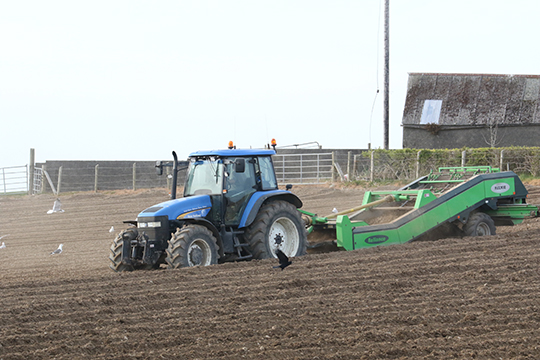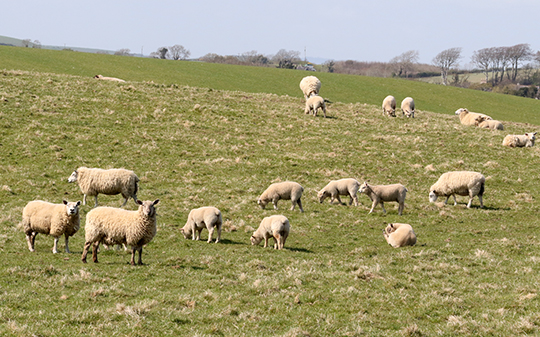The NI Assembly Agriculture Committee has expressed its concern over the debate of the UK Agriculture Bill in the Commons reading.
The Assembly’s Agriculture, Environment and Rural Affairs Committee (AERA) has expressed its concern that the Agriculture Bill, which was debated in the House of Commons yesterday, could have the potential to impact negatively on the agri-foods industry here in Northern Ireland.
The Committee had initially voiced concern, in its February 2020 report on the bill, about the potential for post brexit trade deals to result in the UK import of cheaper foods, produced to a lower standard. Members had noted that this could serve to undercut local farmers, making it more difficult for them to compete in the marketplace, and that it could ultimately pose a serious threat to the future of the industry as a whole.

The Committee Chairperson, Declan McAleer MLA said “The Committee had been supportive of a number of amendments to the bill, that food imported into the UK post brexit, would be produced to at least equivalent environmental, animal welfare and food safety standards.
“Unfortunately, none of these amendments were successful, and we believe that without this safeguard, our local agri-foods sector could be put at a severe competitive disadvantage in the future.
“The UK-EU withdrawal agreement, cemented the absolute necessity for our local agri-foods sector to continue to operate on an all island basis. Any divergence in terms of animal welfare and general food standards in the UK, could pose very serious difficulties to the sector here, in terms of working within the Protocol.
“This bill must serve to protect and benefit all farmers, producers and the consumer; we cannot be placed in a situation where, even if it is by default, our capacity to participate fairly in the marketplace is diminished. Our unique circumstances must be carefully considered within the context of the agreed Protocol.”

Mr McAleer added: “While the Agriculture Bill has passed in the House of Commons, it has yet to be debated and agreed by the House of Lords before it becomes law.
“We will continue to do everything that we can as a committee, to advocate on behalf of the sector and to ensure that our particular circumstances here are fully appreciated and recognised.”
“We quite rightly take pride in the fact that our agricultural foods are produced to the highest standards, and are acknowledged as being amongst the finest in the world. It is crucial, that in an uncertain post-brexit world, we are able to maintain this high level of quality for the consumer, whilst being provided with equal opportunity to trade and compete in a fair and equitable marketplace.”
The Committee also expressed disappointment that an amendment to provide a sunset clause for the Northern Ireland Provisions of the bill, which it had called for in its report, was also defeated.
UFU comment on the House of Commons Agriculture Bill debate.
The Ulster Farmers’ Union (UFU) is bitterly disappointed with the outcome of the House of Commons Agriculture Bill debate. MPs rejected the proposed amendment to the bill that would ensure food imported from any potential trade deal would have to meet UK production standards.
UFU president Ivor Ferguson said: “We are extremely deflated by the result of the House of Commons Agriculture Bill debate. MPs have decided that the Bill remains fit for purpose and no amendments or improvement is needed. This logic has bewildered the entire UK farming community considering how the COVID-19 pandemic has emphasised the importance of local food production and food security.”
The UK Government has publicly indicated its intention to protect both the NHS and UK food standards as it starts its negotiations with the US on a possible trade deal, but yet it won’t back this commitment and provide the much-needed reassurance to do so by including it in the most critical piece of agricultural legislation for many years.
“The MPs decision leaves UK agriculture in a very uncertain position. The fear remains that down the line our market could be flooded with imports produced to standards which would be illegal here, undermining our farmers and putting the entire farm family structure at risk.
“It’s a kick in the teeth to our primary producers who take pride in upholding the highest environmental, animal welfare and food safety standards, and we rely on them now more than ever. It’s extremely concerning that the MPs vote concluded that it wasn’t essential to protect the hand that feeds them.
“Putting our disappointment to the side, it has been overwhelming to see farming, environmental and animal welfare organisations coming together to lobby for one cause.
“It has meant a great deal to our members and consumers who value high-quality, trustworthy production. We’re not giving up on achieving these production amendments and are encouraged by those MPs, particularly our own local political representatives, who did argue strongly in favour of imports needing to meet UK standards.
“We will be discussing the matter with members of the House of Lords in the hope that they feel the bill needs to be amended. Next week the Trade Bill is coming to the House of Commons and this may present the appropriate opportunity to address the matter of import standards,” said Mr Ferguson.
























